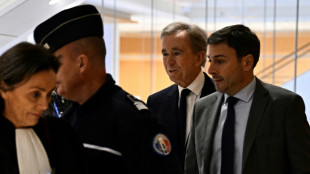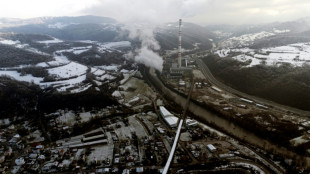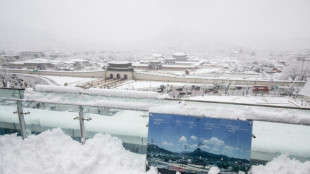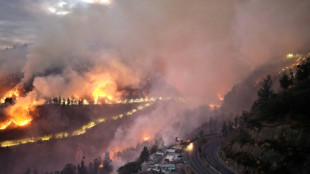
-
 France says ready for budget concessions to avert 'storm'
France says ready for budget concessions to avert 'storm'
-
Lampard appointed Coventry manager

-
 French luxury mogul Arnault defiant at ex-spy chief trial
French luxury mogul Arnault defiant at ex-spy chief trial
-
South Africa bowled out for 191 against Sri Lanka

-
 'Europe's best' Liverpool aim to pile pain on Man City
'Europe's best' Liverpool aim to pile pain on Man City
-
Hezbollah under pressure after war with Israel

-
 OPEC+ postpones meeting on oil output to December 5
OPEC+ postpones meeting on oil output to December 5
-
Zelensky slams Russia's 'despicable' use of cluster munitions in energy strikes

-
 One dead, thousands displaced as floods hit southern Thailand
One dead, thousands displaced as floods hit southern Thailand
-
Lebanon army deploys under Israel-Hezbollah ceasefire

-
 Imran Khan's wife Bushra Bibi emerges as Pakistan protest figure
Imran Khan's wife Bushra Bibi emerges as Pakistan protest figure
-
COP16 biodiversity talks to restart in February: UN

-
 Iran to hold nuclear talks with three European powers
Iran to hold nuclear talks with three European powers
-
French govt ready for budget concessions to avoid financial 'storm'

-
 Hong Kong airport third runway takes off
Hong Kong airport third runway takes off
-
In Bosnia, the path to renewables runs through its coal mines

-
 China probes top military official for corruption
China probes top military official for corruption
-
Syria war monitor says more than 130 dead in army-jihadist clashes

-
 China says top military official Miao Hua under investigation
China says top military official Miao Hua under investigation
-
Taiwan president's plan to stop over in Hawaii, Guam angers Beijing

-
 Russian attacks leave one million Ukrainians without power
Russian attacks leave one million Ukrainians without power
-
Markets mixed after subdued pre-holiday shift on Wall St

-
 What would an ICC arrest warrant for Myanmar's junta chief mean?
What would an ICC arrest warrant for Myanmar's junta chief mean?
-
China says top military official Miao Hua suspended, under investigation

-
 Taiwan's Lai to stop over in Hawaii, Guam during Pacific trip
Taiwan's Lai to stop over in Hawaii, Guam during Pacific trip
-
Namibia extends voting after logistical issues

-
 LIV Golf's Herbert in charge at Australian Open, Smith two back
LIV Golf's Herbert in charge at Australian Open, Smith two back
-
Despair in Sweden as gangs recruit kids as contract killers

-
 Russia launches massive aerial attack on Ukraine's energy sector
Russia launches massive aerial attack on Ukraine's energy sector
-
Peru scientists unveil crocodile fossil up to 12 million years old

-
 At plastic treaty talks, no united front for industry
At plastic treaty talks, no united front for industry
-
Williamson falls for 93 as England fight back in first Test

-
 South Korea officials say three dead in heavy snowfall
South Korea officials say three dead in heavy snowfall
-
High-flying Fiorentina face test of Scudetto credentials with Inter visit

-
 Verstappen switches focus to re-boot defence of F1 teams' title
Verstappen switches focus to re-boot defence of F1 teams' title
-
UK filmmaker Richard Curtis makes first foray into animation

-
 Countrywide air alert in Ukraine due to missile threat
Countrywide air alert in Ukraine due to missile threat
-
China's military corruption crackdown explained

-
 Primark boss defends practices as budget fashion brand eyes expansion
Primark boss defends practices as budget fashion brand eyes expansion
-
Williamson eyes ton as New Zealand take control against England

-
 Norway faces WWF in court over deep sea mining
Norway faces WWF in court over deep sea mining
-
Trump, Sheinbaum discuss migration in Mexico amid tariff threat

-
 Asian markets mixed after subdued pre-holiday shift on Wall St
Asian markets mixed after subdued pre-holiday shift on Wall St
-
Orban's soft power shines as Hungary hosts Israeli match

-
 'Retaliate': Trump tariff talk spurs global jitters, preparations
'Retaliate': Trump tariff talk spurs global jitters, preparations
-
'Anti-woke' Americans hail death of DEI as another domino topples

-
 Trump hails migration talks with Mexico president
Trump hails migration talks with Mexico president
-
Truckers strike accusing Wagner of driver death in Central African Republic

-
 London police say 90 victims identified in new Al-Fayed probe
London police say 90 victims identified in new Al-Fayed probe
-
Air pollution from fires linked to 1.5 million deaths a year


After disastrous election, what happens to Japan's new PM?
Japanese Prime Minister Shigeru Ishiba's ruling coalition fell short of his declared "victory line" of a majority in snap parliamentary elections, media projections showed Monday.
AFP examines the options now for the Liberal Democratic Party (LDP) after its worst result since 2009, and the prospects for its bruised leader Ishiba, who only took office on October 1.
- Why the big loss? -
Fiercely critical of former prime minister Shinzo Abe and his brand of establishment politics, Ishiba has long played on his relative popularity with voters as the LDP's "intraparty foe".
But while this won him the party leadership, in the election citizens were more interested in punishing the LDP over a scandal that saw party members pocket money from fund-raisers.
That the main opposition Constitutional Democratic Party (CDP) recently elected moderately conservative former prime minister Yoshihiko Noda as leader also didn't help.
Briefly in office between 2011 and 2012, and known for his "realistic" stance, "I think the majority of Japanese people trust Noda", said Masato Kamikubo, a politics professor at Ritsumeikan University.
"He is a very stable politician", Kamikubo said.
While the LDP's seats as projected by public broadcaster NHK tumbled to 191, from 259 seats at the last election, the CDP's tally soared to 148 from 96.
Komeito, the LDP's coalition partner, slipped to 24 from 32, with new party chief Keiichi Ishii losing his seat.
- Could the opposition form a government? -
This is tricky given the fragmented opposition, and memories of its tumultuous rule between 2009 and 2012, analysts say.
"The possibility of a handover of power to the opposition isn't zero, but there are far too many opposition parties for any of them to reach a majority," said Yu Uchiyama, a political science professor at the University of Tokyo.
Policy differences and past fallings-out continue to divide and hobble opposition parties, from communists to the liberal CDP, the centrist Democratic Party for the People (DPP) and the "reformist conservative" Japan Innovation Party.
- Can Ishiba find new partners? -
The prime minister has his work cut out to make it happen.
On the campaign trail, CDP leader Noda said it would be "impossible" to join forces with the LDP, having been part of previous no-confidence votes.
The Japan Innovation Party also remains unconvinced, with its head Nobuyuki Baba dismissing a tie-up with the LDP in its current scandal-tainted state as "impossible".
The centrist DPP, too, denied it would sign up for the coalition.
But its leader, Yuichiro Tamaki, left open the possibility of a "partial coalition" where it can offer some flexibility on individual policies it has an affinity with.
- What about Ishiba's future? -
Ishiba will likely therefore have to resort to heading a minority administration, seeking support from other parties on a case-by-case basis.
But this is likely to destabilise Ishiba's nascent power base, and leave him susceptible to challenges from within his own party.
Speculation is growing that Ishiba may be forced to resign to take responsibility for the debacle -- becoming the shortest-serving prime minister in Japan's post-war history.
In a nuanced denial of this prospect, though, Ishiba on Sunday night answered in the affirmative when asked by a reporter whether the prime minister intends to follow through on his duties.
"If the ruling coalition or even just the LDP loses its majority, Ishiba will face harsh criticism from party members", Yosuke Sunahara of Kobe University told AFP before Sunday.
But at the same time, the ruling coalition's loss of a majority in the Lower House only goes to lay bare public disenchantment with the political funding scandal.
So if "Ishiba is ousted while the party tries to gloss over the issue, public backlash against the LDP will intensify," Sunahara said.
"This makes it difficult for Ishiba's rivals within the party to criticise him."
W.Lapointe--BTB
